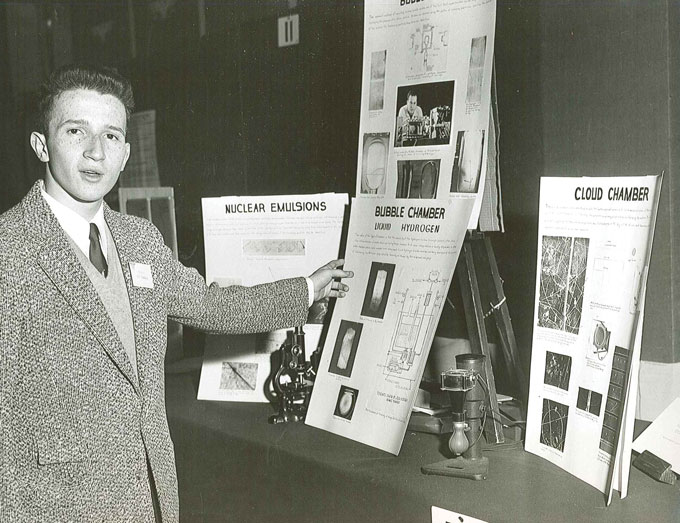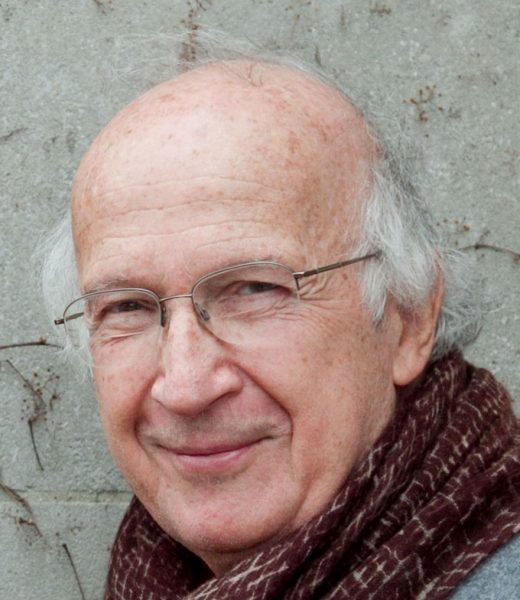Conversations with Maya: Roald Hoffmann

Maya Ajmera, President & CEO of the Society for Science and Publisher of Science News, chatted with Nobel Laureate Roald Hoffmann, an alumnus of the 1955 Science Talent Search, a program of the Society for Science. Hoffmann is the Frank H. T. Rhodes Professor of Humane Letters Emeritus at Cornell University. He is also an accomplished poet and playwright. We are thrilled to share an edited summary of their conversation.
Dr. Hoffmann, you have a very powerful story. Would you be willing to tell us a little bit about your childhood?
My life was divided by a marker, which was coming to America. The first 11 years of my life were spent both in surviving and then being a refugee.
The surviving was a geopolitical consequence of having been born in 1937 in southeast Poland, in a Jewish family just before World War II. The place where I was born was Austria-Hungary when my mother was born, then Poland when I was born, then it was conquered by the Nazis, and then became part of the Soviet Union. Today, it is part of independent Ukraine. Two and a half waves of ethnic cleansing along the way.
Over the years, this was not a very happy part of the world. Only about 200 Jews out of 4,000 in this town survived the war. Among them was my mother and I, but not my father and not my grandparents. The dimensions of the loss are typical of what happened to Jews in that part of the world. It took us five more years to come to America, with the same discriminatory quotas and immigration laws at play as those causing a barrier to immigrants today.
We had the hardest time to come to rejoin an aunt in America. We got here, eventually, as immigrants, and I’m not sure we came entirely legally.” Once we got here, the second chapter of my life opened up. I went to public schools in New York City and studied in a wonderful science-oriented school, Stuyvesant High School, which to this day supplies many of your finalists in the Science Talent Search. Everything opened up in the world.

As a child living in Europe during the Holocaust, you have a pretty extraordinary story. I don’t know if you’d be willing to share about that time. I believe you and your mother were hiding for a while.
Yes, it lasted 15 months. We were in an attic and then in a storeroom. Five of us, my mother and I among them. We were hidden by a courageous and good Ukrainian schoolteacher and his wife who had three small children. They did this at great risk to their life. I was a quiet child, but it was not an easy time. There were sometimes German soldiers and Ukrainian policemen in the house. It’s a great credit to my mother, all the games she invented for me.
Do you remember a game she invented that still sticks out for you?
Yes. This was a schoolhouse with atlases stored in the attic. My mother taught me latitude and longitude, which you usually don’t teach to 5- or 6-year-olds. To probe what I had learned, she then asked me to describe what latitude and longitude I would need to pass in order to travel from Poland to San Francisco, for example. She would give me hard tasks, asking me to go around the Strait of Magellan instead of through the Suez Canal.
Let’s talk about being at Stuyvesant. What was that experience like for you? What was it like doing science research as a high school student and participating in the Science Talent Search?
Stuyvesant High School had always encouraged research experiences for its students, and there were absolutely great teachers in every subject. The only subject I didn’t take advanced placement in was chemistry, which eventually became my profession! I found a professor at NYU who was doing experiments at Brookhaven National Laboratory on tracks left in a bubble chamber, which was a new device for measuring the outcome of nuclear reactions.
The project was an interesting experience, but it did not pull me into physics. It was quite wonderful, however, because it led to me being selected for the Westinghouse Science Talent Search, which included a trip to Washington where I had the opportunity to meet President Eisenhower.
Meeting President Eisenhower, five years after coming to America, had special meaning for me because he was the leader of the armies who had liberated Europe. It was from the Talent Search, eventually, that I got a summer job between high school and college at the National Bureau of Standards. That summer job led to a second summer there — these served as an introduction to real science.
Meanwhile, the world opened up in the arts and the humanities, thanks to a wonderful core curriculum in the liberal arts at Columbia. I’m a strong believer in the liberal arts education. One way to summarize my college career was that I worked up enough courage in college at Columbia to tell my parents I didn’t want to become a doctor, but not enough to tell them I wanted to be an art historian.
What is it about chemistry that has inspired you and continues to inspire you?
I didn’t decide on chemistry right away. In fact, I didn’t make a commitment to chemistry until three-quarters of the way through my Ph.D. in chemistry. I took a year off after two years in graduate school to go to the Soviet Union. This was 1960, the Khrushchev period. Taking a junior year abroad while in graduate school was not done — Harvard thought I was crazy. My mother thought I would be drafted into the Soviet army.
Now, you ask why chemistry. Somehow chemistry, in the end, was the right field for me. Chemistry is not based on certain knowledge. Sometimes our students complain that they have to memorize some things and then they’re also asked to explain some other things, like the mechanism of an organic reaction.
That mixture of part logic and part facts that you are required to know, which you then have to connect with each other, is at the heart of chemistry. One comes to peace with partial knowledge. I love that — somehow it was in resonance with my psychology.
That kind of partial certainty, of having to deal with fuzzy logic, bothers some people. I tell them, if you want certainty, try mathematics. Studying molecules is different, much like dealing with people.
In addition to being a chemist, you publish essays, poetry and plays. Tell us about that — the process of being a poet.
Everything began in college for me. The interest in poetry came from a course with Mark Van Doren, a poet who wasn’t allowed to teach how to write poetry. There were no writing courses in those days. If you wanted to learn how to write, you went to night school at Columbia.
I remember going across the street to Barnard College and seeing a production of Federico García Lorca’s Blood Wedding. Somehow it touched me, wondering how an individual could come to feel that intensely. In time, I tried to write both poetry and plays. Maybe gaining confidence from doing chemistry gave me confidence to try these things.
I’m very glad I did write in time, for it put me in contact with the world of poets and playwrights. I could show you my logbook for submitting poems. Every poem of mine that has been eventually accepted in a magazine has been rejected 10 to 15 times before. Living in that world gives me a better feeling for what people who want to touch us spiritually have to deal with.
How does your childhood experience of surviving the Holocaust influence your view of humanity and the debates that are going on around social justice in the United States and around the world?
I tend to see good motives in the way people act. Perhaps that is not what people expect of someone who survived the Holocaust. The act of survival is sufficient. It is an affirmation of the human spirit that you can survive under extremely difficult conditions. There were a few people willing to risk their lives to help you, like that Ukrainian family I mentioned. That is a great affirmation of the positive nature of human beings. It takes just a few.
Here we are hiding from a virus. Seventy-six years ago, we were hiding from the Nazis. It’s hard to find reasons for affirmation of the human spirit. But they were there, and I strongly believe that they are here. We will overcome.


